A Newsletter on Campus Events, Research, and Civic Engagement October 2020 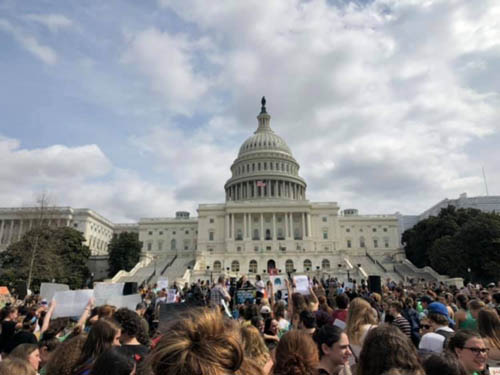 This fall semester is stranger than nearly any in modern memory. With an upcoming historic national election and a pandemic that continues to disrupt nearly all aspects of college life, tensions on campus are running high. Nevertheless, student organizers and faculty members across the country have continued to find ways to endure the pandemic, organize for climate on their campuses, and prepare to get out their peers for the November election. This fall semester is stranger than nearly any in modern memory. With an upcoming historic national election and a pandemic that continues to disrupt nearly all aspects of college life, tensions on campus are running high. Nevertheless, student organizers and faculty members across the country have continued to find ways to endure the pandemic, organize for climate on their campuses, and prepare to get out their peers for the November election. 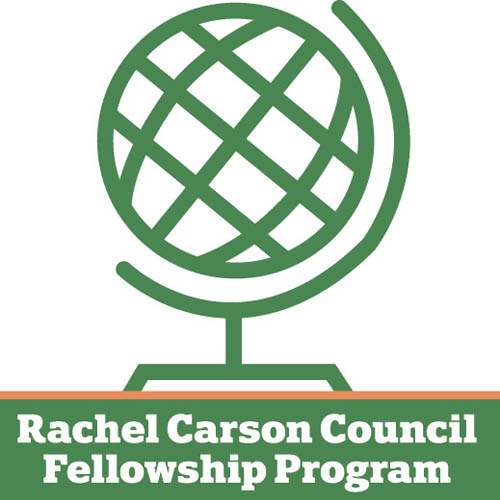 This academic year, nine Rachel Carson Council Fellows are returning, remote and in person, to their campuses. RCC Fellows are engaging in projects ranging from campus food insecurity and the impact of industrial agriculture on campus communities, to university sustainability guidelines and divestment. See their reports from campus below. This academic year, nine Rachel Carson Council Fellows are returning, remote and in person, to their campuses. RCC Fellows are engaging in projects ranging from campus food insecurity and the impact of industrial agriculture on campus communities, to university sustainability guidelines and divestment. See their reports from campus below. • • • • • From Our RCC Fellows Climate Action: The Carbon Commitment and Sustainability
on Campus 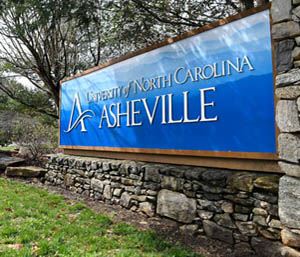 As the climate crisis becomes more and more visible around the globe, student activists have worked here at the University of North Carolina Asheville to take steps to adapt, mitigate, and prepare for its effects. Sustainability has long been a core value at our institution. UNCA has already taken a number of steps to lessen its carbon footprint — implementing sustainable dining practices, placing solar on campus, supporting our entirely student-run Student Environmental Center, placing composting programs in the residence halls, and advancing a bike-friendly campus. As the climate crisis becomes more and more visible around the globe, student activists have worked here at the University of North Carolina Asheville to take steps to adapt, mitigate, and prepare for its effects. Sustainability has long been a core value at our institution. UNCA has already taken a number of steps to lessen its carbon footprint — implementing sustainable dining practices, placing solar on campus, supporting our entirely student-run Student Environmental Center, placing composting programs in the residence halls, and advancing a bike-friendly campus. Importantly, UNCA has divested 10% of its endowment from fossil fuels and will potentially divest more in the future. Now students and faculty are strongly advocating for the university to sign onto the Carbon Commitment, a pledge to work to achieve carbon neutrality by 2050 that offers campus sustainability organizers a flexible, effective and measurable way to fight climate change. Read more at RCC As Campuses Close, Where Does That Leave Students
Without Housing? 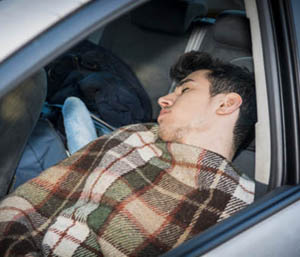 “You know we have students who go here living out of their cars, right?” she said. It was spring, before COVID-19, and just another week for me volunteering at the student food pantry. But I suddenly stopped stocking shelves. Sister Rose, who runs the Hawks Harvest student food pantry at the University of North Carolina – Wilmington (UNCW), made me do a double take. “You know we have students who go here living out of their cars, right?” she said. It was spring, before COVID-19, and just another week for me volunteering at the student food pantry. But I suddenly stopped stocking shelves. Sister Rose, who runs the Hawks Harvest student food pantry at the University of North Carolina – Wilmington (UNCW), made me do a double take.
“I keep a list of students that are struggling with issues like this. If they get into any problems, I’m first on the list to call. They need all the help they can get.” Read more at RCC The Bitter Side of Sugar 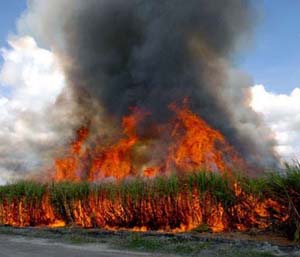 The COVID-19 pandemic has upended lives in countless ways, but for some residents in Palm Beach County, Fla., the respiratory virus poses an even deadlier risk to their health and well-being. The COVID-19 pandemic has upended lives in countless ways, but for some residents in Palm Beach County, Fla., the respiratory virus poses an even deadlier risk to their health and well-being.
While thousands of parents fear sending their kids back to school because of COVID-19, those in Glades, a small rural community south of Florida’s Lake Okeechobee, fear sending their kids back because of exposure to particulate-polluted air. The cause for this pollution? The outdated practice of sugarcane burning. The cheap yet effective method works well because the water-rich sugarcane stalks permit farmers to freely set the surrounding dry cane leaves ablaze before harvest. This leaves only the sugar-rich stalks behind along with the harmful byproducts of smoke, soot and ash. Read more at RCC Hurricanes and Marginalization: How Climate Disasters Affect LGBTQ+ Persons 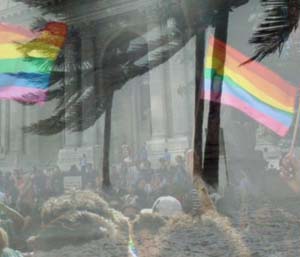 In the early morning of August 29th, 2005, Hurricane Katrina battered the coastal shores of Louisiana, Mississippi, and Alabama. The Category 4 hurricane brought extreme flooding, resulting in the failure of New Orleans’ aging levee system. Torrential downpours, combined with the inundation of the city’s two rivers, led to 80% of New Orleans being underwater. Local agencies tasked with providing aid and community support were immobilized, prompting widespread chaos as residents struggled to find adequate food, shelter, and clean water. Many of the tens of thousands of residents that stayed behind huddled in shelters such as the Mercedes Superdome, where tensions ran high, supplies ran low, and the threat of waterborne bacteria became an increasing concern. Others chose to evacuate and seek shelter in the surrounding inland areas of Louisiana, creating massive traffic jams that left evacuees stranded on the interstate. Read more at RCC In the early morning of August 29th, 2005, Hurricane Katrina battered the coastal shores of Louisiana, Mississippi, and Alabama. The Category 4 hurricane brought extreme flooding, resulting in the failure of New Orleans’ aging levee system. Torrential downpours, combined with the inundation of the city’s two rivers, led to 80% of New Orleans being underwater. Local agencies tasked with providing aid and community support were immobilized, prompting widespread chaos as residents struggled to find adequate food, shelter, and clean water. Many of the tens of thousands of residents that stayed behind huddled in shelters such as the Mercedes Superdome, where tensions ran high, supplies ran low, and the threat of waterborne bacteria became an increasing concern. Others chose to evacuate and seek shelter in the surrounding inland areas of Louisiana, creating massive traffic jams that left evacuees stranded on the interstate. Read more at RCC Swapping Sea Walls for Salt Marsh? Can Plants Save a North Carolina Island? 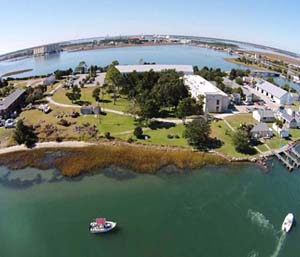 Long marsh grasses fringe the shoreline on Pivers Island, home to NOAA’s National Centers for Coastal Ocean Science and the Duke Marine Lab, in Beaufort, North Carolina. On a calm day, waves lap at the rock sill that frames salt marsh planted along the shore. As waves tumble over the marsh, woody-stemmed plants trap sediment and dissipate wave energy, holding the shoreline together. Long marsh grasses fringe the shoreline on Pivers Island, home to NOAA’s National Centers for Coastal Ocean Science and the Duke Marine Lab, in Beaufort, North Carolina. On a calm day, waves lap at the rock sill that frames salt marsh planted along the shore. As waves tumble over the marsh, woody-stemmed plants trap sediment and dissipate wave energy, holding the shoreline together.
The salt marsh around Pivers Island has not always been there—it was planted in the early 2000’s, replacing a degraded bulkhead with a living shoreline. Made of plants, sand, or rock, living shorelines protect and stabilize coastal land using native vegetation and habitats. Read more at RCC More Universities Should Invest in Solar Energy: What Holds Them Back? 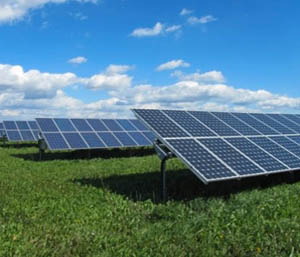 As a student at a small women’s college in North Carolina, I work to see changes on our campus that reflect the ideals and values that Meredith College promotes in its pronouncements and marketing. I want to see my administrators uphold priorities that will provide the most authentic learning environment possible, and commit to taking visible steps toward a greener campus culture. Such actions would affect all Meredith students. A commitment to clean energy would demonstrate a credible concern for the climate crisis and solidify the college’s claims to sustainability and to racial and environmental justice. Read more at RCC As a student at a small women’s college in North Carolina, I work to see changes on our campus that reflect the ideals and values that Meredith College promotes in its pronouncements and marketing. I want to see my administrators uphold priorities that will provide the most authentic learning environment possible, and commit to taking visible steps toward a greener campus culture. Such actions would affect all Meredith students. A commitment to clean energy would demonstrate a credible concern for the climate crisis and solidify the college’s claims to sustainability and to racial and environmental justice. Read more at RCC Click Here to Follow Our Fellows Throughout the Year • • • • • RCC Fellows in the News RCC Fellow (2020-2021) Emily Irigoyen of Vanderbilt University and
RCC Fellow Kelsey Hall (2019-2020) UNC-Asheville Grad DivestVU Calls For End to Vanderbilt Investment in Fossil Fuel 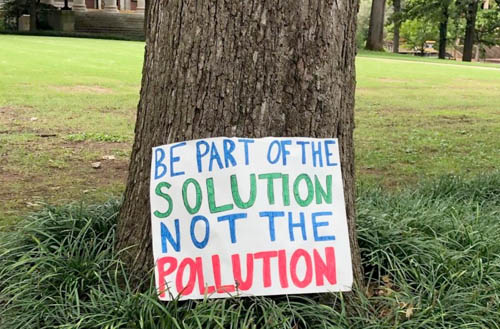 DivestVU is a new campaign led by Vanderbilt undergraduate and graduate students to pressure the university to divest from fossil fuels. DivestVU is a new campaign led by Vanderbilt undergraduate and graduate students to pressure the university to divest from fossil fuels.
This movement is not an isolated incident at Vanderbilt alone. In fact, students and climate activists across the country have taken up similar campaigns to encourage their respective universities to divest from fossil fuels, many of which have seen success. While Vanderbilt’s movement began at the start of the fall semester, movements at other colleges across the country began in the early 2010s. Vanderbilt’s campaigns manifested in the form of two organizations: DivestVU and Dores Divest. “Two movements emerged at the same time,” co-founder of DivestVU Emily Irigoyen said. “It just goes to show that it was bound to happen. People want change.” Read more at the Vanderbilt Hustler 'Our house is burning': Student Climate Protesters Urge Their Universities to Go Carbon Neutral 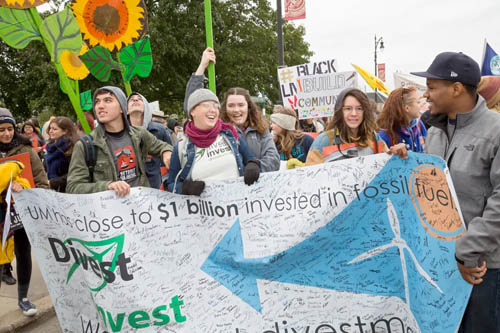 As West coast wildfires color the skies dystopian red and orange and an aggressive hurricane season batters the US Gulf coast, college students are demanding their schools take bold action to address the climate crisis. As West coast wildfires color the skies dystopian red and orange and an aggressive hurricane season batters the US Gulf coast, college students are demanding their schools take bold action to address the climate crisis.
Caitlyn Daas is among them. The senior at Appalachian State University and organizer with the Appalachian Climate Action Collaborative (ClimACT) stands on the frontlines of her school’s grassroots push to go “climate neutral”, part of a years-long, national movement that has inspired hundreds of institutional commitments to reduce academia’s carbon footprint. Read more at The Guardian • • • • • On Campus Pandemic Imperils Promotions for Women in Academia 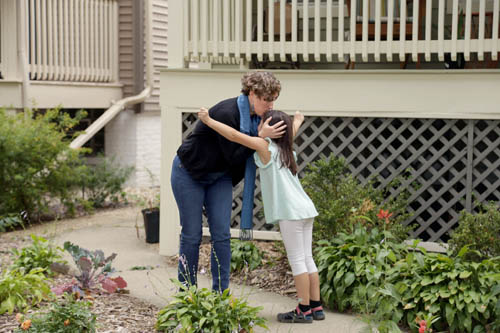 Like millions of parents, Kimberly Marion Suiseeya, a political-science professor at Northwestern University, saw her work life upended when her third grader’s school shut down in March. Later, she was demoralized to learn that local schools would not reopen this fall. Like millions of parents, Kimberly Marion Suiseeya, a political-science professor at Northwestern University, saw her work life upended when her third grader’s school shut down in March. Later, she was demoralized to learn that local schools would not reopen this fall.
But Dr. Marion Suiseeya faced an additional source of stress: her looming all-or-nothing tenure evaluation, which will determine whether she earns a lifetime appointment at Northwestern or must find a new job. “This year was critical for me to finalize my tenure packet,” she said. “I stare at my computer and try to be productive. And every five minutes my daughter comes in and says, ‘My Zoom link doesn’t work.’” Read more at The New York Times Student Climate Protesters Urge Their Universities to Go
Carbon Neutral 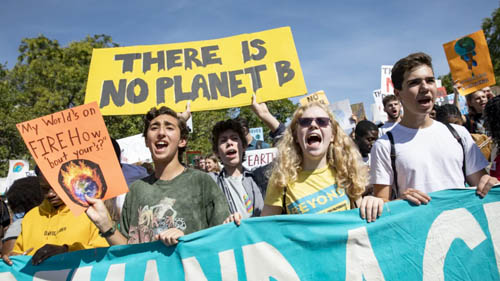 As West coast wildfires color the skies dystopian red and orange and an aggressive hurricane season batters the U.S. Gulf coast, college students are demanding their schools take bold action to address the climate crisis. As West coast wildfires color the skies dystopian red and orange and an aggressive hurricane season batters the U.S. Gulf coast, college students are demanding their schools take bold action to address the climate crisis.
Caitlyn Daas is among them. The senior at Appalachian State University and organizer with the Appalachian Climate Action Collaborative (ClimACT) stands on the frontlines of her school's grassroots push to go "climate neutral," part of a years-long, national movement that has inspired hundreds of institutional commitments to reduce academia's carbon footprint. Carbon neutrality commitments typically require schools to dramatically cut their carbon emissions by reimagining how they run their campuses — everything from the electricity they purchase to the air travel they fund. Colleges across the country, from the University of San Francisco to American University in Washington DC have already attained carbon neutrality. Read more at EcoWatch Black Microbiologists Push for Visibility Amid a Pandemic 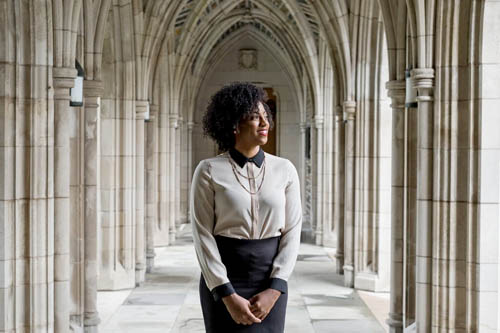 A few days before her fifth-grade science fair, Ariangela Kozik awoke to the overwhelming scent of poultry past its due. It was exactly what the young scientist had been hoping for. A few days before her fifth-grade science fair, Ariangela Kozik awoke to the overwhelming scent of poultry past its due. It was exactly what the young scientist had been hoping for.
“Whew,” she recalled thinking at the time. “There is definitely something growing in here.”
She rushed into her kitchen, where a neat stack of glass Petri dishes awaited her, each filled with a gelatinous brown disk made of beef broth and sugar. Atop many of the cow-based concoctions was a smattering of what looked like shiny, cream-colored pimples. Each was a fast-ballooning colony, teeming with millions and millions of bacteria, including several from the swab of raw chicken juice she had dabbed on three days before. Read more at The New York Times A Student Dies, and a Campus Gets Serious About Coronavirus 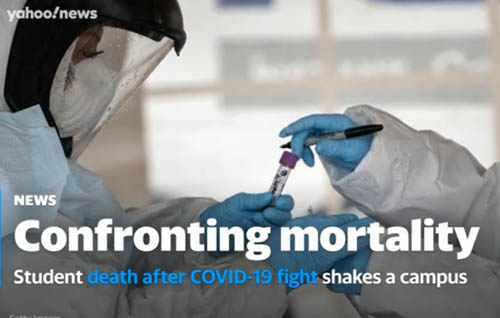 Since Sept. 28, when a sophomore at his college, Appalachian State University in Boone, N.C., died from suspected COVID-19 complications, Chase Sturgis says he has been thinking about his own fight with the coronavirus — and his own mortality. Watch the video at Yahoo News Since Sept. 28, when a sophomore at his college, Appalachian State University in Boone, N.C., died from suspected COVID-19 complications, Chase Sturgis says he has been thinking about his own fight with the coronavirus — and his own mortality. Watch the video at Yahoo News • • • • • Voting Resources  Now just weeks away, the 2020 election will have massive ramifications for both our college campuses and the futures of our students. As voter registration deadlines draw near, here are some tools for both educators and students to mobilize their peers and get out the vote on November 3 (or sooner!) Now just weeks away, the 2020 election will have massive ramifications for both our college campuses and the futures of our students. As voter registration deadlines draw near, here are some tools for both educators and students to mobilize their peers and get out the vote on November 3 (or sooner!)  Nationwide Voting Information Voter Registration, Elections, and Voting FAQ COVID-19 Voting Information Get Election Reminders America's Best Colleges for Student Voting 2020 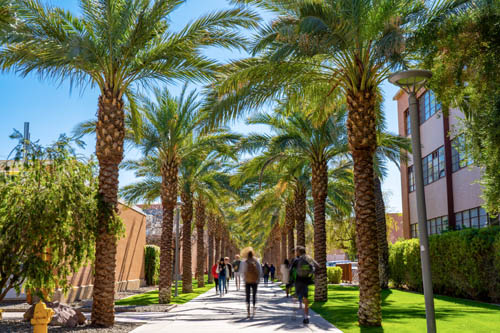 On November 3, Americans will vote in an election unlike any other in U.S. history. As COVID-19 rages across the country, many will find themselves voting by mail for the first time. Others will wait in long lines at the fewer polling places that are open because their state government has made voting by mail difficult or impossible. If localities are imprudent about in-person voting—by having people line up indoors, for example—some will doubtlessly get sick as a result, leading to a terrible trade-off between political participation and physical health. On November 3, Americans will vote in an election unlike any other in U.S. history. As COVID-19 rages across the country, many will find themselves voting by mail for the first time. Others will wait in long lines at the fewer polling places that are open because their state government has made voting by mail difficult or impossible. If localities are imprudent about in-person voting—by having people line up indoors, for example—some will doubtlessly get sick as a result, leading to a terrible trade-off between political participation and physical health. For even the most seasoned voters, this will likely be a fraught and challenging process. But for America’s college students, it will be especially perplexing. Young people are, by definition, the age group least experienced with the act of voting. Read more at Washington Monthly Climate Voting Information 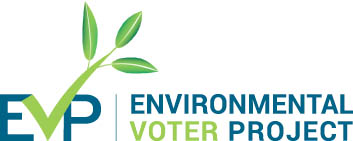
 • • • • • 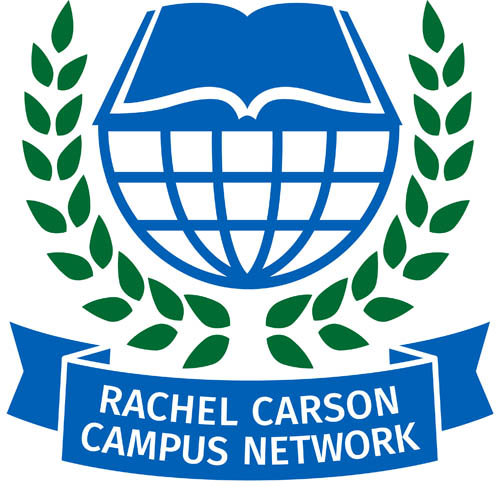 RCC Campus Network RCC Campus Network Students: Keep Up the Pressure 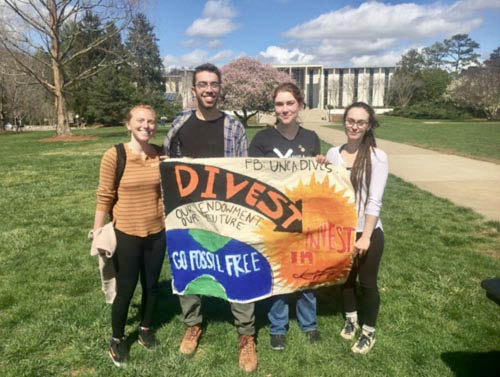 It isn’t easy being a college student in 2020. After the Coronavirus halted spring semesters, the normal rhythm of the academic year has been disrupted and does not seem set to return entirely to normal anytime soon. For many, this means continuing their work for change and justice on campus at a time in the nation’s history when those efforts have rarely been more critical. It isn’t easy being a college student in 2020. After the Coronavirus halted spring semesters, the normal rhythm of the academic year has been disrupted and does not seem set to return entirely to normal anytime soon. For many, this means continuing their work for change and justice on campus at a time in the nation’s history when those efforts have rarely been more critical.
Students, wielding power both on their campuses and in their communities, have often acted as a catalyst for change. In 1960, a group of four black students in Greensboro, North Carolina decided to take a seat at the lunch counter of the local Woolworth’s. Within three days, joined by women from nearby Bennett College, the students, all of whom were teenagers had attracted nearly 300 others to their cause and sparked more than fifty other similar protests across the south over the course of the following summer. Read more at RCC Historic Solar Deal Powers Duke U. Toward Carbon Neutrality 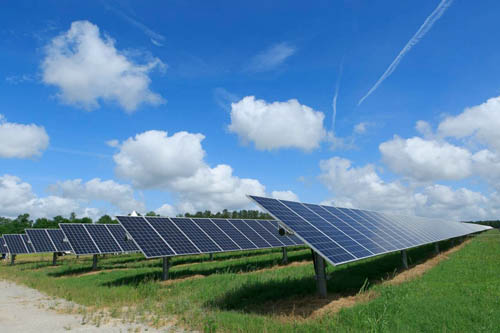 Duke University’s ambitious effort to become carbon neutral by 2024 will add an expanded solar energy component through a partnership with an Asheville, North Carolina-based solar developer. Duke University’s ambitious effort to become carbon neutral by 2024 will add an expanded solar energy component through a partnership with an Asheville, North Carolina-based solar developer.
The university will bolster its renewable energy capabilities through the purchase of 101 megawatts of solar capacity from three new solar facilities planned for North Carolina starting as early as next year. The university will partner with Pine Gate Renewables to build the new solar farms, which are expected to be online by 2022. It is the largest such initiative in North Carolina under Duke Energy’s Green Source Advantage program. Read more at Duke Today Chatham University Praised in Report for Sustainability Efforts 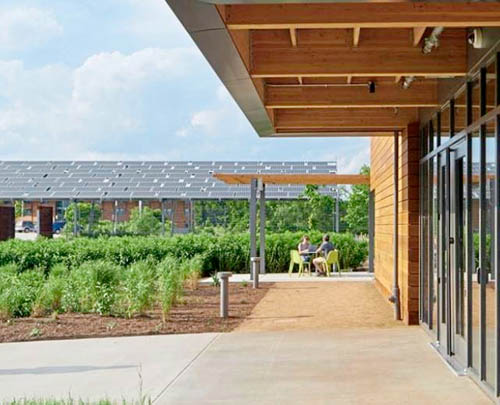 Chatham University in Pittsburgh was ranked second in a study of the nation’s top colleges for their use and consumption of renewable energy. The study was conducted by the environmental advocacy group PennEnvironment Research & Policy Center. Chatham University in Pittsburgh was ranked second in a study of the nation’s top colleges for their use and consumption of renewable energy. The study was conducted by the environmental advocacy group PennEnvironment Research & Policy Center.
The report compares local colleges and universities to other institutions across the country, paying special attention to areas including electricity, heating, hot water, clean vehicles and others. Chatham was named in the report as the No. 2 nationwide for its use of renewable heating, cooling, hot water and other non-electric energy. The university uses three solar thermal systems to heat all of its water, according to the report. Read more at TribLive Yale Experts Explain Environmental Justice | Yale Sustainability 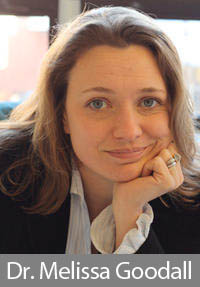 Event Date and Time: October 15th, 2:00 - 3:00pm EST Event Date and Time: October 15th, 2:00 - 3:00pm EST
Location: Zoom, click here to register for the webinar.
Event Description: In 2015 193 countries signed on to the UN Sustainable Development Goals as a commitment to solving the most pressing global challenges of our time. Join Prof. Dan Esty and Dr. Melissa Goodall to learn more about the Goals, and how Yale’s teaching and research can be part of the solution. Notre Dame-backed Solar Project Breaks Ground in
St. Joseph County  Indiana Michigan Power (I&M) broke ground recently on a $37 million solar project that will provide clean energy credits equal to 10 percent of the University of Notre Dame’s total demand for electricity, helping the University meet its goals around clean, renewable energy. Indiana Michigan Power (I&M) broke ground recently on a $37 million solar project that will provide clean energy credits equal to 10 percent of the University of Notre Dame’s total demand for electricity, helping the University meet its goals around clean, renewable energy.
“This is the next big step for us with regard to the use of clean, renewable solar energy to aid or offset campus power production, and a piece of a larger puzzle in terms of our overall approach to sustainability,” said Paul Kempf, assistant vice president for utilities and maintenance at Notre Dame. “We’re pleased to partner with I&M on this project, and look forward to the benefits it will provide.” Read more at Notre Dame News ACC Becomes First Community College in Texas to Use 100% Renewable Energy 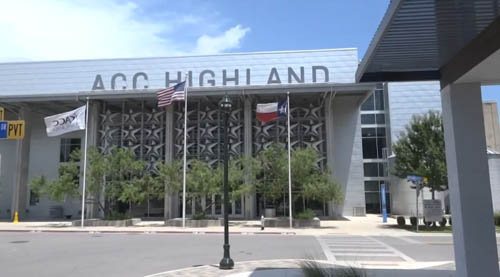 Austin Community College (ACC) is making major strides toward going green. Two ACC campuses now use 100% clean, renewable energy, according to the college. Austin Community College (ACC) is making major strides toward going green. Two ACC campuses now use 100% clean, renewable energy, according to the college.
The switch to clean energy at the ACC campuses in Round Rock and Elgin makes ACC the first community college in Texas to have campuses that use entirely wind and solar power. ACC's 100% renewable energy efforts started this summer. "ACC is committed to becoming a leader in sustainability. That means using less energy and fewer resources while minimizing waste," said Dr. Richard Rhodes, ACC chance. Read more at KVNU ABC America's Top Colleges for Renewable Energy 2020 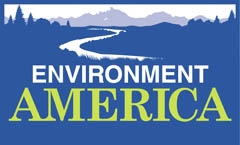 America’s colleges and universities are leading the transition to a 100 percent renewable energy system. Small liberal arts colleges, large public universities and community colleges alike, from every corner of the U.S., are taking the lead in reducing energy consumption, deploying renewable energy technologies, and switching to electric vehicles (EVs). America’s colleges and universities are leading the transition to a 100 percent renewable energy system. Small liberal arts colleges, large public universities and community colleges alike, from every corner of the U.S., are taking the lead in reducing energy consumption, deploying renewable energy technologies, and switching to electric vehicles (EVs). The nation’s leading campuses for clean energy – from Georgetown University to the University of Idaho – are setting a strong example for other colleges and the nation as a whole to follow. More than 40 colleges and universities now obtain 100 percent or more of their electricity from renewable energy sources. Read more at Environment America • • • • • RCC RESOURCES 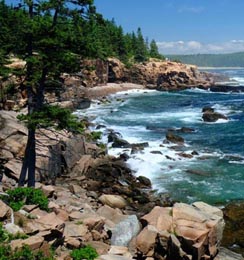 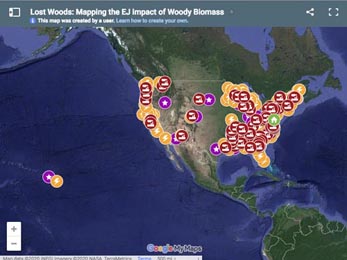 PS: Have you seen the new resources on our website? This summer, the Rachel Carson Council unveiled an interactive data map tracking the wood pellet industry. The RCC also launched our new Coasts and Ocean Program, highlighting many of the specific challenges facing our coastal communities and environments. PS: Have you seen the new resources on our website? This summer, the Rachel Carson Council unveiled an interactive data map tracking the wood pellet industry. The RCC also launched our new Coasts and Ocean Program, highlighting many of the specific challenges facing our coastal communities and environments. Find both here: ___________________________________________________________________________________  The Rachel Carson Council depends on tax-deductible gifts from concerned individuals like you. Please help if you can. The Rachel Carson Council depends on tax-deductible gifts from concerned individuals like you. Please help if you can.  Sign up here to receive the RCC E-News and other RCC newsletters, information and alerts. Sign up here to receive the RCC E-News and other RCC newsletters, information and alerts. |